World
Social pressure is too high: Over 440,000 'lying flat' individuals in South Korea reach a new record

The number of "lying flat" youth in South Korea aged 15 to 29 has reached a historic high of 443,000, marking a 10.4% increase from last year. The term "lying flat" refers to individuals who, while not suffering from severe illness, choose not to work temporarily. These youths represent 5.4% of South Korea's 8.15 million young people, setting a new record.
According to reports, this non-economic activity population consists of those who, despite not having illnesses or disabilities, opt to "lie flat" without a specific reason. They are neither classified as employed nor unemployed.
Among the lying flat youth, 75.6% have no intention of working at all, while those who do seek employment face issues such as mismatched salaries and conditions, and a lack of skills and experience. With the increase in the lying flat population, the youth employment rate in South Korea fell to 46.5% in July, marking three consecutive months of decline. However, because the lying flat individuals are not counted in the unemployment figures, the unemployment rate actually decreased by 0.5 percentage points.
Academics believe that the lack of quality job opportunities and the slow recovery of labor-intensive industries have exacerbated the polarization of the job market. The wage gap between large enterprises and small-to-medium-sized businesses is 1.6 times, with the average salary in large companies at 5.91 million won in 2022, compared to 2.86 million won in smaller businesses. Additionally, the retirement age in large enterprises is extended, and smaller businesses prefer candidates with experience, making it harder for youth to find jobs.
This year, over 30% of young people have opted for short-term contracts of less than a year as their first job. The lying flat youth cause a dual loss to society and the economy: their knowledge and skills are wasted, the country fails to fully utilize its labor force, and young people, unable to find ideal jobs, forgo relationships, marriage, and childbirth. This leads to reduced income, weakened domestic demand, and overall adverse effects on the economy and society.
- 47 reads
Kamala Harris Gains Popularity: Poll Shows Nearly Half of U.S. Adults Hold Favorable View

A recent poll shows that 48% of American adults have a favorable view of Democratic presidential candidate Kamala Harris, surpassing President Biden's 38% favorability rating before he withdrew from the race.
As the Democratic National Convention (DNC) approaches, Harris is set to attend, supported enthusiastically by fellow Democrats. Her popularity has not only improved, but public recognition of her is also higher than that of Biden before he withdrew. Additionally, Harris slightly outperforms Republican presidential candidate Donald Trump, who holds a 41% favorability rating.
Among American men, about half have a negative view of Harris, with roughly 60% of white men expressing disapproval. White men without a college degree, a demographic traditionally strong in Trump’s support base, are particularly unfavorable toward Harris. On the other hand, Harris enjoys better favorability among white women, with 49% holding a positive view and 46% negative. Among those over 60 years old, around 50% view her favorably, up from 46% in June. It appears that if Harris is to win, she must work to suppress Trump's ability to galvanize white male voters.
Overall, as both Harris and Trump's campaign teams rush to define her as a new candidate in the race, more Americans are forming new opinions about her, leading to an increase in her favorability. The percentage of Americans who feel they do not know enough about Harris to evaluate her has dropped from 12% in June to 6% now.
Additionally, Harris leads Trump by 9% in the area of "possessing an effective spirit of public service." Many polls indicate that as Harris takes up the mantle of the Democratic Party, more voters are beginning to see her as more suited for the presidency than Biden, and she is receiving more support than Trump in many aspects, successfully reversing Trump's earlier lead.
- 71 reads
LDP Presidential Election: Young Lawmakers Push for Generational Shift, Back Kobayashi
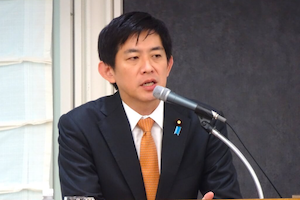
Recently, the election for the president of Japan's Liberal Democratic Party (LDP) has become a focal point, with young and mid-career lawmakers within the party calling for a generational change and openly supporting Takayuki Kobayashi. They believe Kobayashi is the best candidate to lead the LDP into a new era. With his youthful image and policy proposals, Kobayashi has garnered significant support from many young lawmakers. They emphasize that the LDP needs a leader who can reflect the demands of the younger generation and address Japan’s current challenges, including economic recovery, declining birth rates, and diplomatic issues.
Young and mid-career lawmakers argue that the current leadership’s age structure has led to more conservative policies that fail to fully address the increasingly diverse needs of Japanese society. They see Kobayashi’s candidacy as an opportunity for reform, bringing new energy to the LDP and helping the party remain competitive in future elections.
On the other hand, the party’s conservative faction remains cautious, with some senior lawmakers questioning Kobayashi’s policy capabilities, citing his lack of experience and potential inability to handle complex domestic and international situations. Despite this, the call for generational change is growing louder, becoming a central theme in this election.
As election day approaches, competition within the LDP is intensifying. Whether the support from the younger faction can translate into actual votes for Kobayashi will be a key factor in determining the election outcome. Regardless of the result, this election has highlighted the need for generational change within Japanese politics and the younger generation's hopes for the future direction of the country.
- 50 reads
Thailand's second female Prime Minister, Srettha Thavisin, has been elected as Prime Minister

On the 16th, Thailand's House of Representatives voted to approve Paetongtarn Shinawatra as the new Prime Minister. She will become the third Prime Minister in her family, following her father, Thaksin Shinawatra, and her aunt, Yingluck Shinawatra. Paetongtarn is also Thailand’s youngest-ever Prime Minister and the second female Prime Minister in the country's history.
According to the Thai constitution, a Prime Ministerial candidate must receive the support of a majority of the House of Representatives to be elected. With 493 members in the House, Paetongtarn Shinawatra was elected with 319 votes in favor, 145 against, and 27 abstentions, securing the position as the 31st Prime Minister.
At 37 years old, Paetongtarn is the youngest daughter of former Prime Minister Thaksin Shinawatra. Her election makes her the third Prime Minister from her family. Her father, Thaksin, was a popular but controversial figure who was ousted in a 2006 military coup. Her aunt, Yingluck, became Prime Minister in 2011 but was also eventually forced into exile. Thaksin returned to Thailand in 2023 and is currently on parole after being convicted of corruption charges.
After her election, Paetongtarn stated that her primary task would be to revitalize the economy. Whether she will continue the 10,000-baht digital wallet policy left by former Prime Minister Srettha Thavisin is also a matter of public interest. According to constitutional procedures, Paetongtarn's appointment as Prime Minister will take effect once it receives formal approval from the King.
- 50 reads
Thai Prime Minister Shot and Injured; Constitutional Court Rules Unconstitutional and Unfit for Office
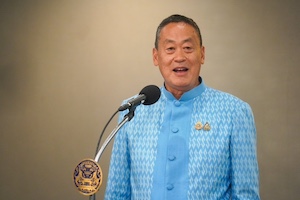
Real estate tycoon Srettha Thavisin, who was elected Prime Minister of Thailand in August last year, made a minor cabinet reshuffle at the end of April this year. Among the changes, he appointed legal advisor Phichit Chuenban as Minister of the Prime Minister's Office. This appointment was contested by 40 former senators, leading the Constitutional Court to rule on the 14th that it was unconstitutional and to remove Srettha from his position as Prime Minister, as well as dissolve the cabinet.
The controversy originated from a 2008 land acquisition case where Phichit, acting as a lawyer, represented then-Prime Minister Thaksin Shinawatra. Phichit was accused of attempting to bribe a judge with 2 million baht and was sentenced to six months in prison. His controversial past led to collective objections from legislators, who argued that both Srettha and Phichit violated ethical standards for cabinet ministers as outlined in the Thai constitution. They requested the Constitutional Court to determine the suitability of Srettha and Phichit for their respective positions.
Although Phichit resigned under public pressure before the Constitutional Court session, the incident still had significant repercussions for Prime Minister Srettha. The court ruled him unfit for office, and Srettha was removed less than a year into his tenure, with 5 out of 9 Supreme Court justices declaring the appointment unconstitutional. Thailand's political scene has been highly unstable over the past 20 years, with several governments or parties being dissolved or removed by the Constitutional Court for unconstitutional actions.
Following Srettha's dismissal, Deputy Prime Minister Phumtham Wechayachai will temporarily assume the role of Prime Minister. It is expected that on the 16th, members of parliament will select a new Prime Minister from the list of candidates proposed during last year's parliamentary elections.
- 35 reads
Kishida Withdraws from LDP Presidential Race; Multiple Contenders Compete for Next Prime Minister
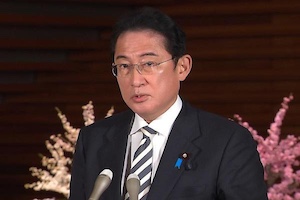
According to an NHK report on August 14, Prime Minister Fumio Kishida will not participate in the LDP's presidential election scheduled for September, indicating that he will not continue in his role as Prime Minister. Kishida has served as LDP president since September 2021, marking a full three years in office. However, his administration has faced poor approval ratings and constant internal pressure from within the party. With the LDP still holding a majority in the Upper House of Parliament, the new president will also be appointed as the next Prime Minister.
The race to succeed Kishida has become highly competitive, with several prominent figures vying for the position. These include former LDP Secretary-General Shigeru Ishiba, multiple ministers such as Taro Kono and Toshimitsu Motegi, Economic Security Minister Sanae Takaichi, and younger politicians like former Environment Minister Shinjiro Koizumi and former Economic Security Minister Takayuki Kobayashi. Candidates must first receive recommendations from 20 party members and then secure a total of 764 votes, including both parliamentary and party member votes, in the first round. In the second round, the number of party member votes will be reduced from 382 to 47, with a total of 429 votes remaining.
Due to a previous scandal involving kickbacks within party factions, most of the six LDP factions have disbanded, leaving only the Aso faction. Kishida's election in 2021 was strongly supported by former Prime Minister Shinzo Abe’s faction, while Taro Aso's 2008 election was similarly backed by Abe's predecessor faction. Without the influence of these factions, the direction of the vote and the election outcome are harder to predict. Although some members of Parliament still organize study and exchange meetings, the public is not pleased with such factional operations. The LDP's ability to rejuvenate itself will depend on the results of this election.
- 50 reads
Clouds of war are gathering in the Middle East, and Iran is expected to retaliate against Israel within this week
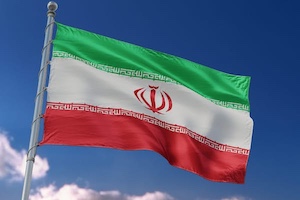
Tensions are rising once again in the Middle East, with the Iranian government announcing plans to retaliate against Israel within this week. This news has quickly drawn international attention, raising concerns that the escalating tensions between the two countries could trigger a broader conflict. Many global airlines have already canceled or suspended flights to the region or are avoiding airspace over Iran and neighboring countries.
On the 14th, the Iranian government issued a statement accusing Israel of attacking Iranian-backed armed groups in recent military actions, resulting in numerous civilian casualties. Additionally, Israel’s recent assassination of a Hamas leader was described by Iran as crossing a red line. Iranian leaders emphasized that, to defend national dignity and security, they will undertake a "necessary and powerful" response.
Israel has yet to make an official response to Iran's statement, but high-ranking Israeli military officials have indicated that they are closely monitoring the situation and preparing to address any potential threats. An Israeli government spokesperson underscored that Israel has the right to defend itself and will take all necessary measures to protect its national security.
The escalation of this retaliation threat is rooted in the recent worsening of the situation in the Middle East. Reports indicate that Iranian-backed armed groups have been active in Syria and Lebanon, and Israel has conducted multiple airstrikes against these groups in an attempt to diminish their threat to Israel. These airstrikes have sparked strong dissatisfaction from Iran, further intensifying the conflict between the two nations.
The international community has expressed concern over the situation. The United Nations Secretary-General has called for both sides to exercise restraint to prevent an expansion of military conflict. He warned that any escalation could have serious implications for the security situation across the Middle East and even globally. Additionally, the European Union and the United States have each issued statements urging Iran and Israel to resolve their differences through dialogue and diplomatic means. The U.S. Navy has dispatched warships and submarines to the Middle East to bolster Israel's defenses.
- Read more
- 48 reads
As casualties in the Gaza war escalate, Hamas demands the implementation of Biden's ceasefire plan.
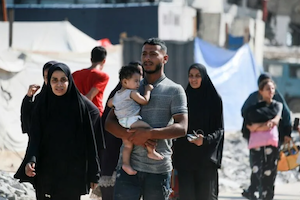
As Palestinian civilians continue to seek shelter from new Israeli military actions, the armed group Hamas urged mediators in the Gaza conflict on the 11th to implement the ceasefire plan proposed by U.S. President Biden, rather than engage in further negotiations.
Hamas issued this statement a day after an Israeli airstrike on a school in Gaza City housing displaced Palestinians, resulting in 93 deaths. This was the deadliest incident since the war between Israel and Hamas broke out on October 7 last year. The strike, along with the assassination of a leader of a militant group allied with Iran, has raised concerns about the potential escalation of the Middle East conflict. International mediators have invited Israel and Hamas to resume talks, aiming to reach a ceasefire agreement and secure the release of hostages.
Israel has accepted invitations from the U.S., Qatar, and Egypt to participate in a new round of negotiations on the 15th. On the 11th, Hamas expressed a preference for implementing the ceasefire plan that Biden proposed on May 31, which was later endorsed by the United Nations Security Council, "rather than holding further rounds of negotiations or considering new proposals." Hamas "calls on mediators to present an implementation plan based on Biden’s vision and the United Nations Security Council resolution... and to force the [Israeli] occupiers to comply."
When Biden announced the plan, he described it as a three-phase "roadmap toward a lasting ceasefire and the release of all hostages," stating that it was proposed by Israel. However, subsequent mediation efforts have failed to reach an agreement. Israeli Prime Minister Benjamin Netanyahu has also been accused of prolonging the war for political gain.
- Read more
- 54 reads
Israel Airstrike on Gaza School: Hamas Claims Over 100 Dead
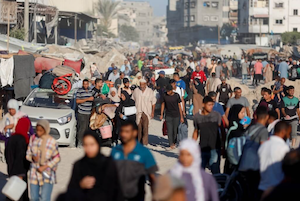
Deutsche Welle Chinese reports: The Gaza health ministry stated that an Israeli airstrike on a school resulted in at least 100 deaths. At the time of the strike, approximately 6,000 refugees were housed in the school. Al Jazeera, citing the Palestinian Civil Defense, reported that many people were burned alive in the attack. However, these casualty figures have not been independently verified by third parties.
The Israel Defense Forces claimed that from Friday night to early Saturday morning, they carried out an airstrike on a Hamas command center located within a school in northern Gaza, and they asserted that "terrorists" were successfully targeted. The IDF stated that this command center was situated next to a mosque within the school grounds, and multiple measures were taken before the strike to minimize civilian harm, including the use of precision-guided munitions.
The Palestinian Islamic Jihad condemned the strike, labeling it a "horrific massacre" and accusing Israel of aiming to kill as many civilians as possible, including the elderly and children. The Egyptian government also condemned the airstrike, arguing that Israel has no intention of reaching a ceasefire agreement or ending the conflict.
Meanwhile, the United States urged all parties to avoid further escalation. U.S. Secretary of State Antony Blinken, in a call with Israel's defense minister, emphasized the urgency of a ceasefire, stating that it would aid in the release of hostages and the restoration of broader regional stability.
- Read more
- 63 reads
Japan Issues First Temporary Information on South China Sea Trench Earthquake
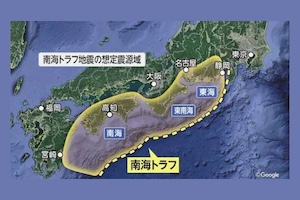
On the afternoon of August 8, at around 4:42 PM Japan time (3:42 PM Taiwan time), a magnitude 7.1 earthquake was detected in southern Miyazaki Prefecture, with the epicenter located off the coast in the Hyuga-nada Sea. The Japan Meteorological Agency subsequently issued its first-ever "Temporary Information on South China Sea Trench Earthquake," warning of the potential for a major earthquake within the next week. The Japanese government had previously estimated in 2019 that if a magnitude 9.1 earthquake were to occur in the South China Sea Trench, the number of casualties could reach up to 231,000, which is 13 times the number from the 2011 Tōhoku earthquake.
In 2012, an expert panel from the Cabinet Office predicted that a massive magnitude 9.1 earthquake could occur in the South China Sea Trench, exceeding the magnitude 9.0 of the 311 earthquake. The likelihood of such an event occurring within 30 years is estimated at 70% to 80%, affecting areas including Shikoku, Kinki, and Tokai. The South China Sea Trench refers to the approximately 700 square kilometers of seabed from Suruga Bay to the waters east of Kyushu, a zone where the Philippine Sea Plate and the Eurasian Plate meet, making it a frequent site of major earthquakes. Experts believe that a magnitude 9 earthquake similar to the 2011 Tōhoku earthquake could occur in the South China Sea Trench.
To prevent potential tsunamis from recent large aftershocks, swimming bans and beach closures have been implemented at coastal bathing areas across Japan starting on August 9. According to Asahi Shimbun, the Aoshima Beach in Miyazaki City and four beaches in Shirahama Town, Wakayama Prefecture, have been closed for safety reasons.
The Japan Meteorological Agency noted that between 1904 and 2014, there were 1,737 earthquakes with a magnitude (Mw) of 7 or higher worldwide. Of these, six had a magnitude 8 or higher within seven days in the same region. Naoto Hirata, chairman of the expert review committee and emeritus professor at the University of Tokyo, stated that the likelihood of a major earthquake occurring now is several times higher than usual compared to before unusual phenomena were observed. Areas around the epicenter and its vicinity should remain vigilant.
In response to the situation, Japanese Prime Minister Fumio Kishida has canceled his planned trip to Central Asia, including Kazakhstan, Uzbekistan, and Mongolia, from August 9 to 12, to remain in the disaster-affected region.
- 47 reads
Human Rights
Ringing FOWPAL’s Peace Bell for the World:Nobel Peace Prize Laureates’ Visions and Actions

Protecting the World’s Cultural Diversity for a Sustainable Future

The Peace Bell Resonates at the 27th Eurasian Economic Summit

Declaration of World Day of the Power of Hope Endorsed by People in 158 Nations

Puppet Show I International Friendship Day 2020

